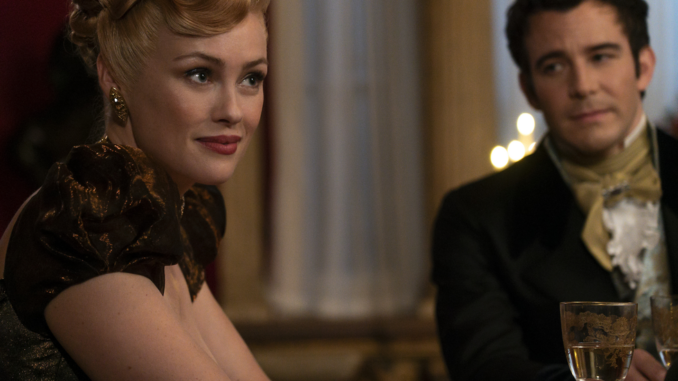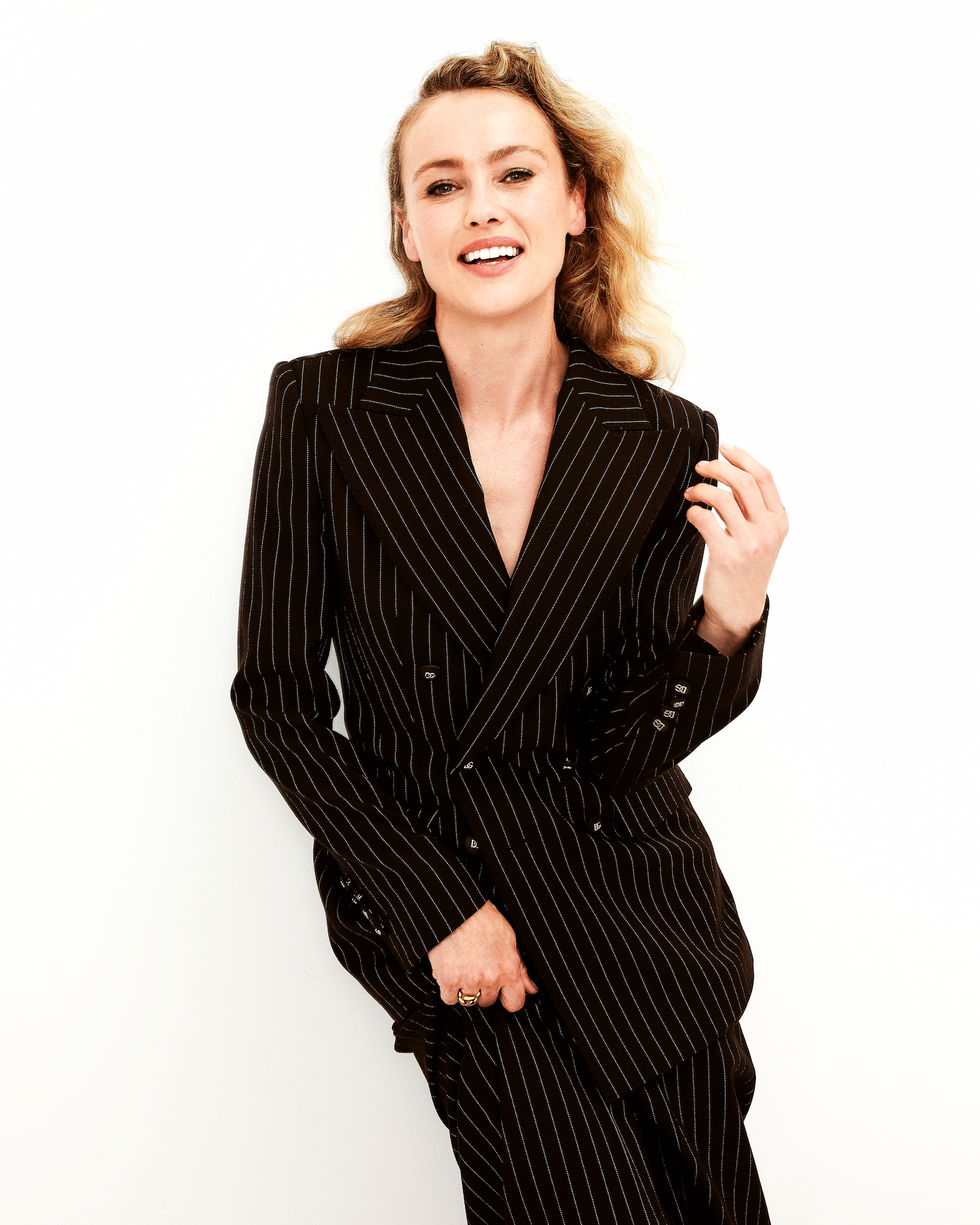
As Lady Tilley Arnold in Bridgerton season 3, the actress was entrusted with directing Benedict toward his own love story.
Spoilers ahead for Bridgerton season 3.
When Hannah New wished upon a (literal) shooting star to win a role on Bridgerton, she hadn’t yet dreamed that job might include awakening Benedict Bridgerton’s long-theorized bisexuality. Star-gazing whilst camping in the Pyrenees, biding her time as she awaited Netflix’s final word, she hoped only to wear the curled blonde tresses and midnight-blue skirts of Lady Tilley Arnold—described in audition materials simply as a “badass widow,” akin to Adjoa Andoh’s Lady Danbury but younger. New didn’t yet understand exactly what Tilley would mean to the second-eldest Bridgerton brother, and thus what she’d mean to the broader Bridgerton fandom.
Three days after that shooting star first appeared, the 40-year-old English actress got the call that the role was hers. Not that her neighbors in West Ireland might ever know. The talented Bridgerton costume and hair departments “make me look so different from my everyday life,” New says when we meet in Manhattan in May. She picks at her grain bowl and grins. “When I go to the local farmer shop to buy a load of chicken feed, I don’t think [anyone] realizes who it is.”
It’s true that New looks a great deal more relaxed sans the puff-sleeve gowns and glinting jewelry characteristic of Lady Arnold. (She feels more at home in T-shirts and wellies.) Born and raised in London but a self-described nomad, she’s lived in England, the U.S., Spain, France, and now Ireland, where her family, her farm, and her cows—Bella and Rose, plus an as-yet-unnamed calf—keep her occupied outside of her stints in film and television projects, such as Black Sails, The Time in Between, and Maleficent.

When we sit down, she’s eager to analyze not just the surprise but the nuances of a major Bridgerton season 3 reveal: Benedict (played by the endlessly charismatic Luke Thompson) is attracted to men as well as women, and Lady Tilley introduces him to a polyamorous threesome with herself and Paul Suarez (Lucas Aurelio). At first, Benedict shies away from the encounter, but in episode 7 he accepts the invitation with enthusiasm, concluding later that he has “love to give in abundance.”
“We do have to acknowledge the stakes,” New tells me over lunch. Sex between men “was punishable by death” in Benedict’s time, during the Regency era. “We still live in a world where the persecution of people just being their authentic selves is a massive problem. That’s why I love the fact that there’s shows like this on TV that are showing, Where have we come from? Where are we going? Why are we moving in that direction?”
Since Bridgerton’s first season dropped in December 2020, fans have speculated that Benedict might be bisexual. (Particularly given his all-but-canonized flirtation with the artist Henry Granville in season 1.) But after Benedict showed no signs of attraction to men in season 2, most audiences assumed they’d fallen for old-fashioned queer-baiting. New understands the frustration, and speaks of Benedict’s turning point in season 3 with genuine tenderness. When the Bridgerton brother first observes Tilley kissing Paul, and when they later invite him into their relationship, there’s “intrigue, but it’s also fear,” New adds. “And I think that’s what’s so liberating about watching the moment where that fear dissipates. Those scenes, for me, from a Tilley point of view, were the most beautiful thing that could be given.”

New acknowledges the subversiveness and controversy of queer polyamory—particularly in 19th-century England—and insists the intent was not to shock. The show “doesn’t push it in your face in a way that feels like, ‘Oh, this is the way that everybody should live,’” she argues. “It’s like, ‘Everybody has to struggle with that tension between what society expects of them, what your family expects of you, and what you expect of yourself.’ All of those struggles are real, and all of them are valid.” The true intent of the relationship, New says, was to offer Benedict the character development that’d open him up for his own love story in season 4 or beyond. “I think it’s that dissipation of fear that allows him to go forward,” she says. “Who knows what’s going to happen in the next season, but I think that there’s this step forward into this idea of committing to yourself, committing to your own spirit to be able to commit to another.”
New, Thompson, and Suarez worked with intimacy coordinator Lizzy Talbot to film their sex scenes, in which New describes “every single move, every single breath, every single look, every single touch” as a “line.” Both Talbot and the actors considered it essential that the scenes not be interpreted as “voyeuristic.” New speaks of these intimate moments, now, with obvious pride: “We live in a society where young people are exposed to porn and sexualized images at such a young age, in such a male-gaze way, that it’s so refreshing to see a moment where a group of people choose to connect to each other because there’s a meeting of minds; it’s a meeting of emotion that isn’t necessarily all about the sex.”
Sensuality, she continues, needed to be felt not only during sex scenes but in dialogue between Benedict, Tilley, and Paul, who share a handful of pursuits beyond the physical. Paul and Tilley banter over their appreciation for Shakespeare; Benedict and Tilley first meet in an aeronaut’s tent. “All of that part of sensuality gets missed in a traditional idea of a menage à trois, you know?” New says.

A history and language buff with a degree in English and Spanish literature, New didn’t have to stretch far to understand Tilley’s life of the mind. But filming a scene in episode 8—in which Tilley admits to Benedict that her feelings for him have grown serious—New discovered how much she admired Lady Arnold’s emotional courage as well, particularly in the face of rejection. “I realized that, in love, when you ignore the feelings that are difficult because you don’t ‘want to be that person,’ you’re not loving authentically,” New says. Tilley “taught me about taking that pause and knowing what that feeling is. The whole season is really about listening to that voice.”
Going into Bridgerton season 3, New understood Tilley would serve as an older, wiser guide to the self-proclaimed ne’er-do-well Benedict Bridgerton. What she didn’t realize was exactly what she’d teach him: She’d introduce him not only to a new understanding of his sexuality, but also prepare him for a more honest form of commitment in the future. Wherever his love story takes him next, “he’s not going to make a choice other than the one that is true to him,” New promises. “Because he’s seen somebody else have to make a choice that’s true to her.”
